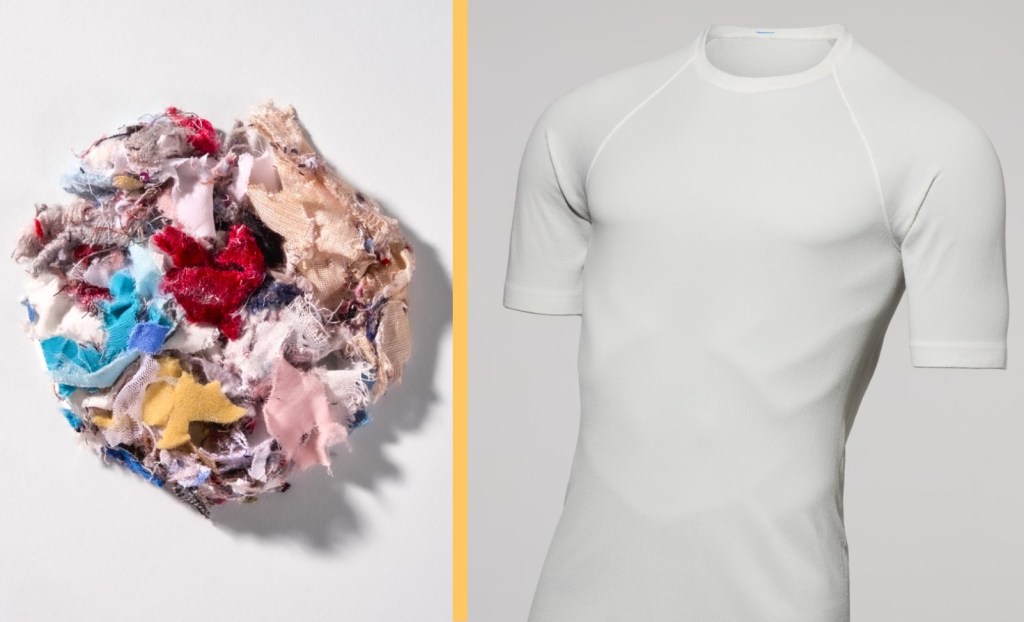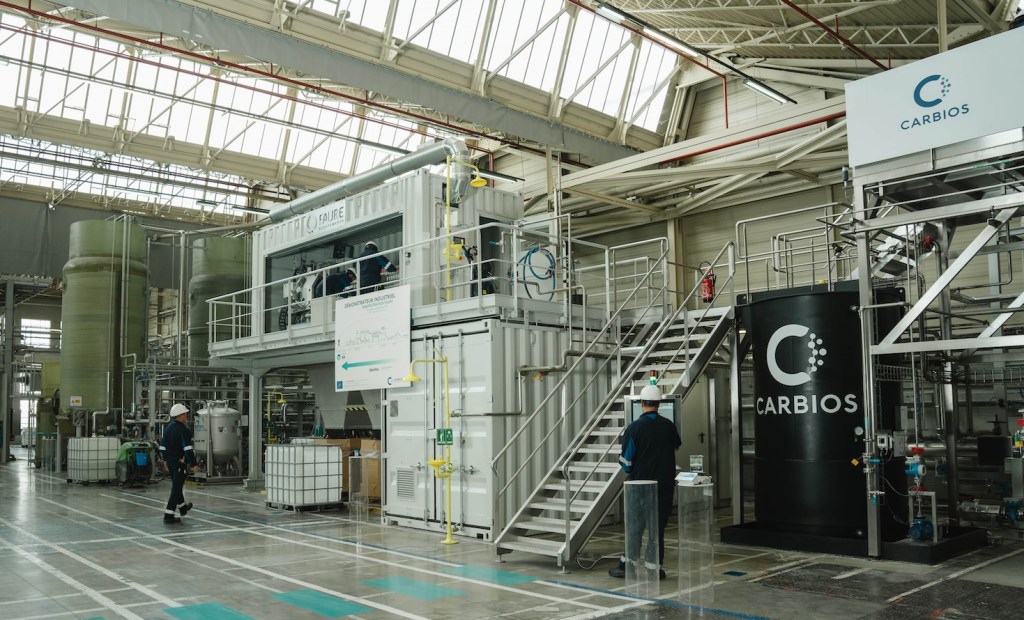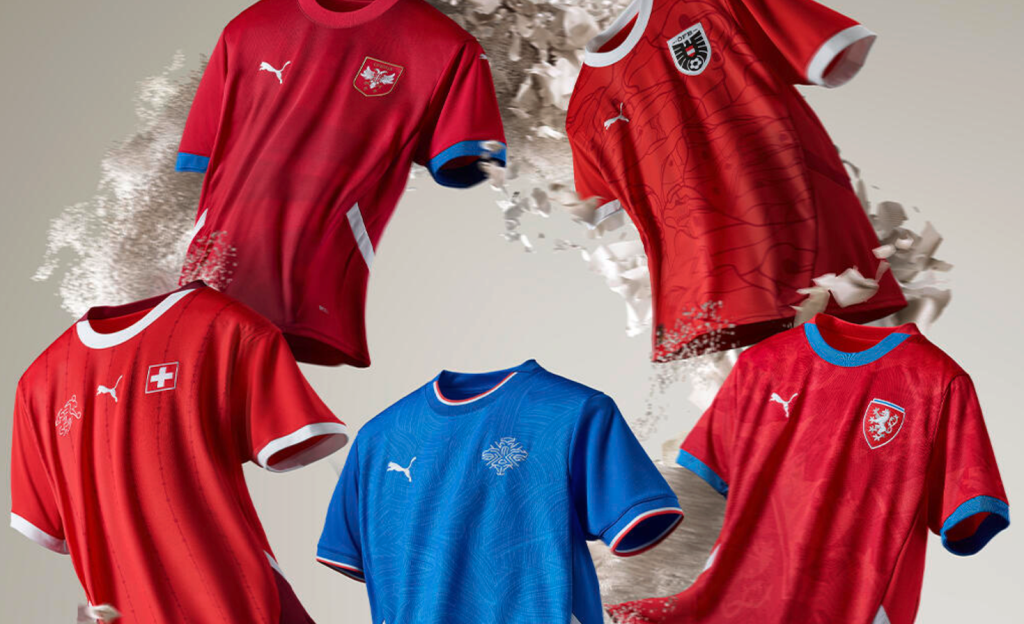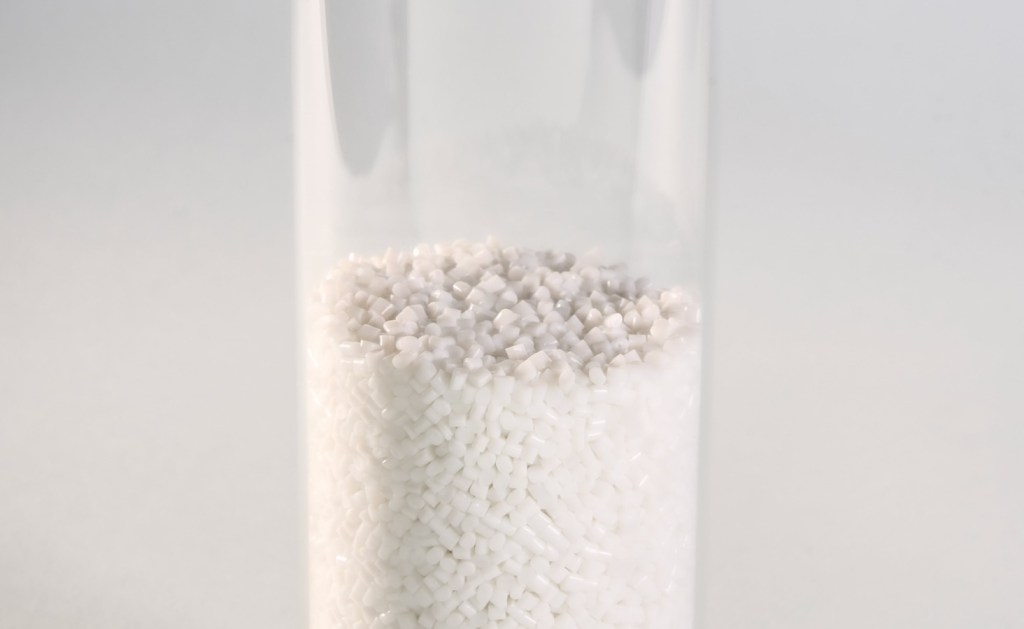This polyester T-shirt can be recycled forever if French startup Carbios has its way
Puma, On, Patagonia, PVH Corp and Salomon all teamed up with Carbios. The result was what they call the world's first 'biorecycled' T-shirt. Now can it be scaled? Read More

The white T-shirt looks as basic as they come. However, it’s in a class apart as the first garment “biorecycled” from other polyester textiles. The proof of concept represents a growing ambition by the fashion industry to make polyester clothing infinitely recyclable, such as aluminum cans, while weaning off of fossil fuels.
The prototype tee emerged out of two years of collaboration by Clermont-Ferrand, France-based startup Carbios. With Puma, Patagonia, PVH, Salomon and On, it sought to prove that enzymes could break down complex polyester fabric blends to make new polyester textiles.
All that needs to happen next is to multiply that shirt, and more garments like it, by the millions.
“We now need to work together to make sure we can scale up this technology to make the largest possible impact,” said Anne-Laure Descours, Puma’s chief sourcing officer, in a statement Oct. 29. “We’re excited to be part of this breakthrough and setting new standards for fiber-to-fiber recycling.”
Startups are vying to build a business case for addressing an epidemic of polyester waste. Carbios is among those, including Samsara Eco, using custom enzymes to break down polyester, also known as polyethylene terephthalate (PET).
“For packaging, there are a few solutions, and Carbios is one of them,” the company’s chief scientific officer Alain Marty told Trellis at the Pack Expo in Chicago on Nov. 5. “But for textile, there is absolutely no solution.”
Hooked on plastic clothes
The apparel industry spews out nearly 10 percent of global greenhouse gas emissions, according to the United Nations. Being hooked on virgin polyester, made from crude oil, doesn’t help. Polyester is the most used fabric in fashion, surpassing cotton.
Only 14 percent of polyester comes from recycled sources, according to the Textile Exchange, a nonprofit. And 99 percent of recycled polyester comes from plastic bottles, which doesn’t close the loop on plastics. That all needs to change, in order to lessen dependence on fossil materials and slash pollution, according to sustainability advocates.
Meanwhile, most clothes are burned or landfilled — at the rate of 87 percent in the European Union alone, according to the European Parliament. Recycling used clothes and scraps, however, addresses several problems at once.

How Carbios biorecycling works
Enzymatic recycling offers technical advantages over chemical recycling that uses catalysts such as zeolites or metals, according to analysts.
“An enzyme, compared to a chemical catalyst, is very selective,” Marty said. “An enzyme is only able to degrade PET, and this at low temperature, consuming less energy.”
It’s hard to judge the superiority of any technology, however, without an apples-to-apples lifecycle analysis for each, according to Richard Wielechowski, a senior analyst at Planet Tracker.
Novonesis of Denmark sells Carbios the enzymes, issued by the bacterium Ideonella sakaiensis. In the brewery-like Carbios pilot and demonstration plant, the custom enzymes munch the polyester polymer down into a monomer. This isolates polyester from fabric blends, such as poly-cotton. That’s important and novel, because it’s impossible with mechanical recycling. Next, Carbios’s partner companies build the monomer back up into a polymer, then spin it into fiber and make new fabric.
How the partnership worked
This textile project followed the model of a project that “enzymatically” recycled drink bottles in 2021 that involved L’Oréal, Nestlé Waters, PepsiCo and others.
In July 2022, Puma, Patagonia, On and Salomon partnered with Carbios. DKNY and Tommy Hilfiger owner PVH Corp piled on in February 2023.
Puma, for one, wants 75 percent of its polyester to come from recycled materials by 2025, in line with the Textile Exchange’s 2025 Recycled Polyester Challenge.
“One of our main ambitions is to drive progress on circularity and renewable materials,” said sneaker maker On’s Director of Sustainability Begum Kurkçu. Based in Zurich, On has experimented with “circular” subscription-based sneakers.
The brands supplied apparel rolls and scraps to Carbios for testing. “This waste material consisted of mixed blends, such as elastane and cotton, and included complex treatments like durable water repellent and a variety of dyes, presenting challenges that conventional recycling methods struggle to address,” Marty said.

Carbios created a PET textile waste preparation line at its pilot plant in Clermont-Ferrand, to reach the rate of treating 100 tons per year.
“From a lab level experiment we were able to scale it up and close the loop between waste and new products without compromising on performance,” said Salomon’s Thibaut Poupard, innovation program manager and sustainability lead for footwear, bags and socks. “It’s a major step for us.”
Brands plan to keep working with Carbios past their original two-year goal.
The Longlaville plant
Carbios is building a new plant in Longlaville, France, to recycle 50,000 metric tons of PET each year, the equivalent of 300 million T-shirts. It’s 500 meters from a PET plant. “It will be in operation beginning of 2026, and it will be the first and the last,” Marty said.
Carbios is not in the business of recycling, but in developing and then licensing its technology. The company has signed letters of intent for future plants for Türkiye, the United Kingdom and China.
“Because we are a technology provider … we want a worldwide market, and it is not easy for a small company like Carbios to build 100 plants,” Marty said.
“This plant, a world first, embodies French innovation in responding to complex environmental challenges, offering a sustainable solution for a future where plastic and textile waste will be transformed into valuable resources for a truly circular economy,” said French President Emmanuel Macron upon its April 25 groundbreaking.

More than 100 engineers worked on the design of the factory, which will employ hundreds of people, Marty said.
Carbios has attracted $77 million in funding. It went public on the Euronext exchange in 2013. The company is getting $3.37 million from the European Commission.
Challenges ahead for Carbios include driving down production costs while amplifying output.
Industry uncertainty remains over how well enzymatic recycling can scale, according to Marcian Lee, a materials research analyst at Lux Research. “I think the biggest problem will be cost – can the recycled polyester be produced at a close enough cost to virgin polyester?” he said. Securing enough polyester to recycle is another challenge, according to Lee.
Carbios’s next ambition is engineering enzymes to munch on nylon, Marty said. It has competition from Samsara Eco of Australia, which has teamed up with legging maker Lululemon.
Even if synthetic fibers can be recycled, however, they still shed microplastics, which abound in nearly every human body and natural environment.
“First of all, if you collect textiles and if there is a market, [it] will not end up in nature,” Marty said. “It is my philosophy. And we are not solving all the problems, but we are solving most of the problems.”













